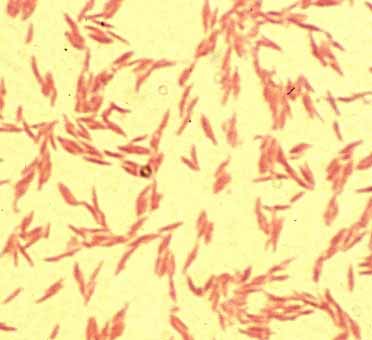A bacterium species called Fusobacterium has been found in high quantities in patients with colon cancer. This sheds new light on this form of cancer, as a role of potential harmful bacteria has never been shown before. While the scientists that made the discovery can not tell anything about a causal relationship of Fusobacterium prevalence and the onset of tumours in the colon, it provides a new angle for research. And that may lead to new ways to treat the disease, that currently kills around 600.000 people worldwide each year.
Scientists used nine patients with colon cancer in their experiments. They did a genetic analysis of the DNA in tumours, and compared them to healthy tissue in the colon. They found that tumour tissue has much more Fusobacterium DNA than healthy tissue. While this does not prove a causal relationship, it is peculiar that the bacterium is more prevalent at spots in the colon where a tumour is growing. Therefore, it seems very likely that the bacterium plays a role in the disease process.
Fusobacterium is a known pathogen. It causes various diseases in humans, but has never been implied in cancer before. But because it has already been shown that this bacterium species can cause inflammation in the colon, it is definitely worth pursuing. Inflammatory diseases can severely disrupt cells, and thus increase the risk of cancer, which hints at a causal relationship between Fusobacterium and colon cancer.
Other micro-organisms have been shown to cause cancer. One of the most famous examples of the present days is probably the Human Papilloma Virus (HPV), that causes cervical cancer. Micro-organisms can cause cancer by disrupting our cells. They become dysregulated and start to assert 'wrong' behaviour. This includes uncontrolled growth. One of the 'benefits' of micro-organism-induced cancer is that it is possible to develop a vaccine for it. This succeeded with HPV, which can now effectively be prevented.
It was already known that the environment of the colon, with many micro-organisms that have found their home there, plays an important role in the health of the tissue. A change in the environment, for example due to the replacement of 'good' bacteria with 'bad' bacteria, can cause various diseases. Bacteria have several features in our body, and balance is important for a proper functioning gut. With so-called probiotics, companies have tried to get people to drink substances that have a lot of 'good' bacteria, with a promise to make you healthier. While probiotics do seem like an interesting research area, there is no proper evidence for a causal relationship between these probiotic drinks and health benefits.
Colon cancer is the third most diagnosed cancer worldwide, and is often hard to cure once the disease has progressed. There is no proper treatment available, except for crude methods such as radiation therapy or chemotherapy. The implication of a bacterial influence means other forms of treatment can be tried: antibiotics could help in fighting colon cancer, if there would be a causal relationship. Future experiments, probably in animals, are needed to elucidate the exact role, and the treatability of colon cancer by targeting Fusobacterium.
Scientists used nine patients with colon cancer in their experiments. They did a genetic analysis of the DNA in tumours, and compared them to healthy tissue in the colon. They found that tumour tissue has much more Fusobacterium DNA than healthy tissue. While this does not prove a causal relationship, it is peculiar that the bacterium is more prevalent at spots in the colon where a tumour is growing. Therefore, it seems very likely that the bacterium plays a role in the disease process.
Fusobacterium is a known pathogen. It causes various diseases in humans, but has never been implied in cancer before. But because it has already been shown that this bacterium species can cause inflammation in the colon, it is definitely worth pursuing. Inflammatory diseases can severely disrupt cells, and thus increase the risk of cancer, which hints at a causal relationship between Fusobacterium and colon cancer.
 |
| Fusobacterium, as seen under the microscope. |
It was already known that the environment of the colon, with many micro-organisms that have found their home there, plays an important role in the health of the tissue. A change in the environment, for example due to the replacement of 'good' bacteria with 'bad' bacteria, can cause various diseases. Bacteria have several features in our body, and balance is important for a proper functioning gut. With so-called probiotics, companies have tried to get people to drink substances that have a lot of 'good' bacteria, with a promise to make you healthier. While probiotics do seem like an interesting research area, there is no proper evidence for a causal relationship between these probiotic drinks and health benefits.
Colon cancer is the third most diagnosed cancer worldwide, and is often hard to cure once the disease has progressed. There is no proper treatment available, except for crude methods such as radiation therapy or chemotherapy. The implication of a bacterial influence means other forms of treatment can be tried: antibiotics could help in fighting colon cancer, if there would be a causal relationship. Future experiments, probably in animals, are needed to elucidate the exact role, and the treatability of colon cancer by targeting Fusobacterium.

No comments:
Post a Comment